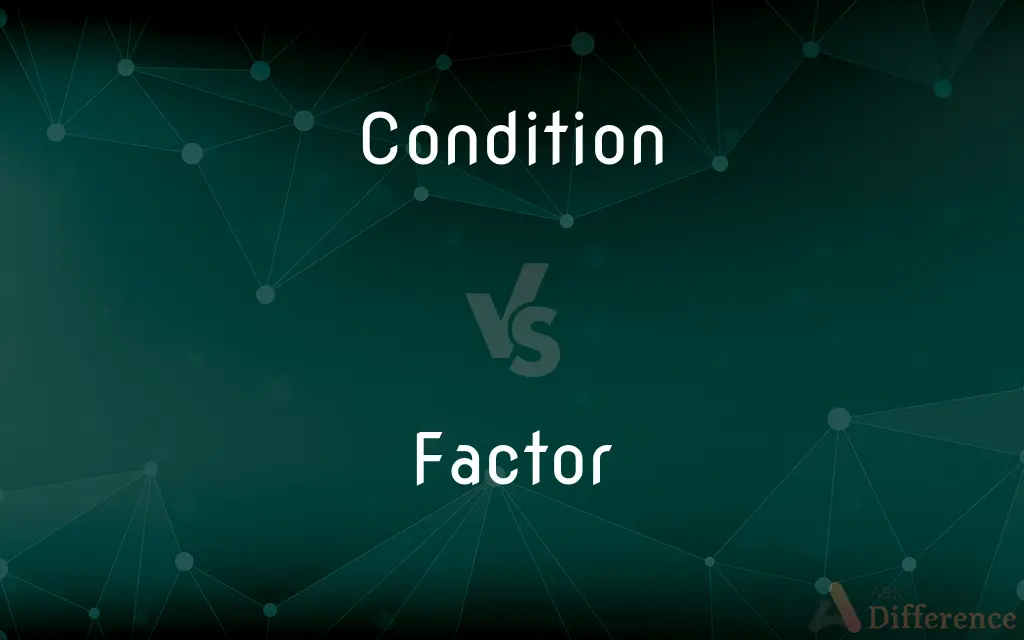Condition vs. Factor — What's the Difference?
By Fiza Rafique & Urooj Arif — Updated on March 2, 2024
A condition is a specific state or circumstance that affects or determines the outcome of a process, while a factor is an element or component that contributes to a result or situation.

Difference Between Condition and Factor
Table of Contents
ADVERTISEMENT
Key Differences
Conditions often refer to the overall environment or set of circumstances in which an event occurs, impacting the event's nature or outcome. For instance, weather conditions can determine the success of an outdoor event, encapsulating various elements like temperature, humidity, and precipitation. Factors, on the other hand, are more specific elements within those conditions that influence outcomes. In the context of the outdoor event, a factor could be the temperature, which directly affects attendees' comfort and participation levels.
Conditions can be seen as broader contexts that set the stage for activities or phenomena, shaping how they unfold. These can include social, economic, physical, or environmental states that influence the effectiveness, feasibility, or nature of an action. Factors, conversely, are usually individual components within these broader conditions, acting as contributors rather than overarching scenarios. They can be isolated and often quantified to assess their impact on a situation.
Conditions are the controlled environments or variables under which experiments are conducted, essential for ensuring the reliability and validity of the findings. Factors within these conditions might include specific variables being tested, such as the amount of a chemical in a reaction. This distinction highlights the role of conditions in providing a controlled setting for observing the effects of various factors.
The relationship between conditions and factors is often interdependent, with conditions providing the context for factors to exert their influence. Understanding this relationship is crucial in fields like research, planning, and strategy, where identifying and manipulating specific factors within given conditions can lead to desired outcomes.
While both terms are used to discuss elements that affect outcomes, their usage emphasizes different scales and scopes of influence. Conditions refer to broader contexts or environments, whereas factors are the discrete elements within these contexts that drive results.
ADVERTISEMENT
Comparison Chart
Definition
A state or circumstance affecting a situation.
An element contributing to a situation.
Scope
Broad, encompassing overall environments.
Specific, referring to individual components.
Role
Sets the stage for phenomena to occur.
Acts within conditions to influence outcomes.
Example Usage
Weather conditions affect crop growth.
Rainfall is a factor in crop yield.
Application
Used to describe general scenarios.
Used to identify elements for analysis or intervention.
Compare with Definitions
Condition
Preconditions set for something to happen.
Loan approval is subject to certain conditions.
Factor
An element contributing to a particular result.
Diet is a key factor in maintaining good health.
Condition
The state of something with regard to its appearance, quality, or working order.
The car was in excellent condition.
Factor
A circumstance, fact, or influence that contributes to a result.
Stress was a factor in her poor performance.
Condition
In medicine, a patient's health state.
The patient's condition was stable after surgery.
Factor
In mathematics, a number or quantity that when multiplied with another produces a given number or expression.
3 is a factor of 12.
Condition
A circumstance affecting an event's outcome.
The success of the space launch depends on weather conditions.
Factor
In business, an agent who buys and sells goods on commission.
The textile factory used a factor to market their products.
Condition
In programming, a situation that must be true for a code segment to execute.
The if condition checks for user age.
Factor
In biology, a gene that determines a trait.
The gene factor for eye color is well studied.
Condition
The state of something with regard to its appearance, quality, or working order
The wiring is in good condition
The bridge is in an extremely dangerous condition
Factor
A circumstance, fact, or influence that contributes to a result
His skill was a factor in ensuring that so much was achieved
She worked fast, conscious of the time factor
Condition
A situation that must exist before something else is possible or permitted
All personnel should comply with this policy as a condition of employment
For a member to borrow money, three conditions have to be met
Factor
A number or quantity that when multiplied with another produces a given number or expression
An amount that exceeds it by a factor of 1000 or more
Condition
Conditions Existing circumstances
Economic conditions have improved. The news reported the latest weather conditions.
Factor
A level on a scale of measurement.
Condition
Specify as a condition or requirement in a contract or agreement; make an express demand or provision in an agreement;
The will stipulates that she can live in the house for the rest of her life
The contract stipulates the dates of the payments
Factor
Resolve into factors;
A quantum computer can factor the number 15
Common Curiosities
Can a factor also be a condition?
In some contexts, a factor might be broad enough to be considered a condition, especially if it significantly shapes the overall environment or outcome.
How do conditions and factors interact?
Conditions set the context in which factors operate, with factors influencing outcomes within those set conditions.
Why is it important to understand conditions and factors in planning?
Identifying and understanding both can help in strategizing and making informed decisions to achieve desired outcomes or mitigate risks.
How are factors identified in research?
Through experimentation and analysis, researchers can isolate and identify factors that have a significant impact on their study's outcomes.
Can conditions be controlled or changed?
While some conditions can be controlled or influenced, others, like natural weather conditions, are beyond human control.
What distinguishes a condition from a factor?
Conditions are broader circumstances or states influencing scenarios, while factors are specific elements that contribute within those conditions.
Are conditions more important than factors, or vice versa?
Neither is inherently more important; their significance depends on the context and the specific outcomes being examined.
How do conditions and factors relate to cause and effect?
Conditions can create the scenario for effects to occur, with factors acting as the direct causes within those scenarios.
Can the same element be a condition in one scenario and a factor in another?
Yes, depending on the context and scope of analysis, an element's role as a condition or factor can change.
How do conditions affect decision-making in business?
Understanding the conditions under which a business operates, including market and economic environments, helps leaders make strategic decisions, considering factors like consumer behavior and regulatory changes.
Share Your Discovery

Previous Comparison
Nue vs. Manticore
Next Comparison
Bit vs. PieceAuthor Spotlight
Written by
Fiza RafiqueFiza Rafique is a skilled content writer at AskDifference.com, where she meticulously refines and enhances written pieces. Drawing from her vast editorial expertise, Fiza ensures clarity, accuracy, and precision in every article. Passionate about language, she continually seeks to elevate the quality of content for readers worldwide.
Co-written by
Urooj ArifUrooj is a skilled content writer at Ask Difference, known for her exceptional ability to simplify complex topics into engaging and informative content. With a passion for research and a flair for clear, concise writing, she consistently delivers articles that resonate with our diverse audience.
















































